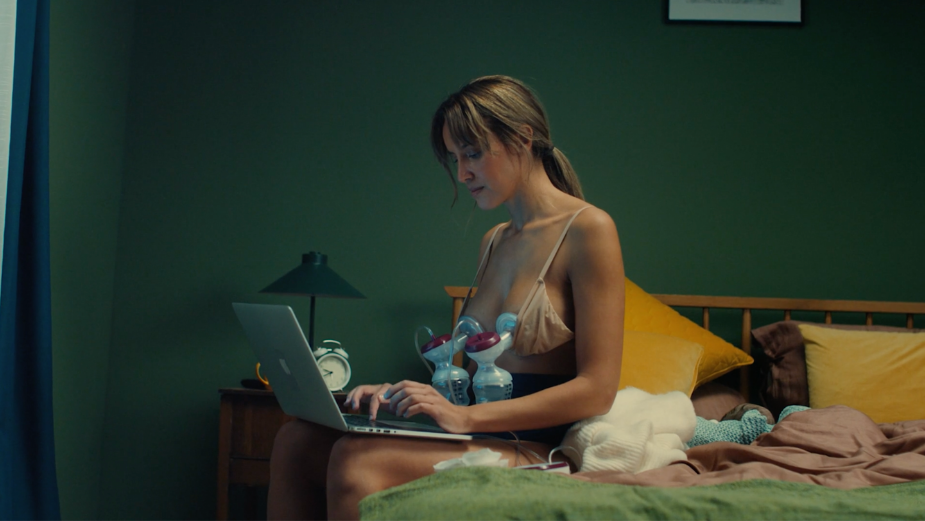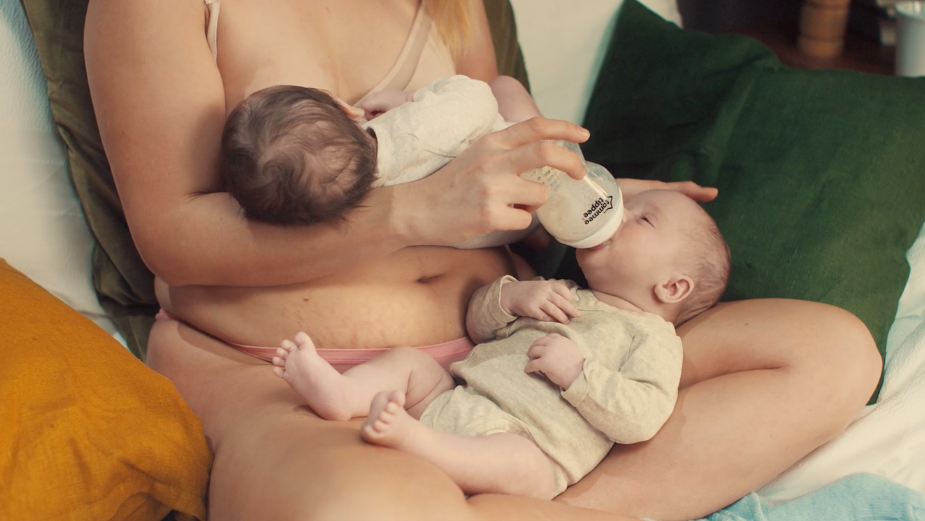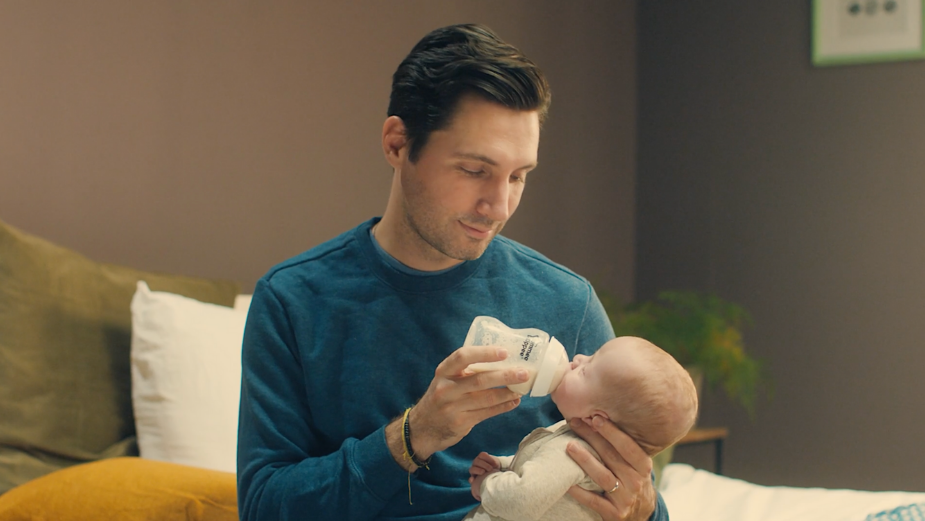
The Boob Life: Behind The Scenes of Tommee Tippee’s Beautiful Ode To Motherhood

It’s hard to think of anything more natural than breastfeeding. However, new mothers often feel that they are sold an idealised ‘one size fits all’ approach to feeding their children. On top of that, a certain taboo around breastfeeding still persists in wider society.
That’s why baby product brand Tommee Tippee is looking to meet mothers and parents where they are - at any stage of their feeding journey. To communicate that message of inclusivity and personalisation, Manifest LDN worked with director Fiona Jane Burgess and OKAY STUDIO’s editor Jo Lewandowska to bring a vibrant, powerful and authentic film to life.
To go behind the scenes of ‘The Boob Life’, LBB spoke with Fiona Jane Burgess and Jo Lewandowska…
Above: Tommee Tippee’s ‘The Boob Life’ campaign communicates an inclusive and personal vision of motherhood.
LBB> Firstly, congratulations on this incredible project! How did it feel to be involved with a campaign that’s really redefining how we perceive motherhood and its complex realities?
Fiona Jane Burgess> In short, it feels long overdue. Before I had kids I had no idea what a breast pump looked like, or how it worked. And I had no idea you could double breast pump, hands free! My experience of new motherhood repeatedly had me thinking “I WISH I had known about this beforehand”.
I wish I had seen what double pumping looked like in action. I wish I had seen women feeling confident in their postpartum bodies, stretch marks and all. I wish I had seen what a baby latching looks like. I wish I had seen other mums using formula to bottle feed, it would have taken the pressure off attempting to solely breastfeed. I wish I had seen someone double pumping whilst writing an email, because this is a reality for lots of working mums. I wish I had seen a mum with a double mastectomy bottle feeding her child, reminding me that all mothers are inspirational and we each face our own unique challenges. I wish I had seen more men bottle-feeding their babies too, because we need to celebrate the role men can play in infant feeding. This film shows it all, and I hope at the very least that this campaign raises some questions about the way we hide the everyday reality of new motherhood rather than celebrate it.
Jo Lewandowska> It felt really great to be a part of such an important project. What I always found strange is that most commercials advertising baby products seem to be directed at babies as opposed to parents. It’s so refreshing to see that Tommee Tippee recognised that and decided to shift the focus.
Women and mothers especially have found themselves overlooked in mainstream culture and I think audiences are pining to see authentic portrayals of motherhood. It was a really profound and eye opening experience for me so I hope that other people feel the same way. To see those women on film looking beautiful, empowered and vulnerable is pretty darn amazing!
LBB> Fiona, you’ve noted that you’re drawn to projects that empower women and provoke debate, so this must have been a really important campaign for you. How did you first get involved and what were the first steps you took?
Fiona> I was approached by Manifest initially. They sent me their creative deck and I was immediately drawn to the project. As someone who began directing shortly after giving birth to twins, this brief resonated with me on a deeply personal level. This was also an opportunity to speak to the parents who are dealing with becoming first-time mums and dads during a pandemic with no immediate help or contact from the outside world. If this film can speak to even a few parents and show them all the ways that feeding an infant is possible, to remind them that there’s no “right” or “wrong” way to feed a baby, to give them the confidence to feed in whatever way best suits their family and their lifestyle, then we have succeeded.

Above: "This campaign celebrates the reality of everyday motherhood"
LBB> How did your own experience of motherhood influence how you approached the project? Was there anything in particular you wanted to touch on in the film?
Fiona> Yes, lots of things! Many women feel like after they have children, the ads for baby products are focussed solely on the baby’s needs. Women post-birth often feel a loss of identity, like their whole purpose in life has somehow shifted and their needs have become less important. This was my experience. So when I found myself in a position to create work that could speak to new mums, my first-hand experience of motherhood was my greatest asset.
First and foremost, it was important to me to show twins in the film, because as a twin parent I remember feeling like I rarely saw myself reflected back in feeding campaigns or in advertisements and it can feel like a very lonely experience if you don’t have other friends who also have twins. It was also important to me to show women who either chose not to breastfeed or couldn’t. One of the mums chose not to breastfeed because she hadn’t had a positive experience breastfeeding her first baby, so she felt more comfortable using a bottle. Another woman in the film had a double mastectomy, which felt important to show since the theme of the campaign was centered around the female body, so I was very aware that everyone’s bodies are different and that we need to represent and celebrate all parents, including people who can’t breastfeed. For the same reason, it was important to show scars and stretch marks and real bodies, rather than anything too “perfect”. I remember feeling deeply insecure about my postpartum body, I always felt like the women I saw in commercials and on baby products were so unrealistic and fake. And finally, it felt really important to show a man bottle feeding. We were aware that this film needed to speak to same sex couples as well, so seeing a man feeding represented the inclusion of men into this narrative.

Above: "We were aware that this film needed to speak to same sex couples as well, so seeing a man feeding represented the inclusion of men into this narrative".
LBB> And Jo, you’ve mentioned that you had many conversations in the edit suite about women’s bodies, feeding babies, sore nipples, and the experience of motherhood in general. Did you learn anything from these discussions that influenced how you approached the edit?
Jo> I learnt a lot during this process. It prompted a lot of conversations with my friends and family. It’s crazy how differently people react to the subject of breastfeeding!
Our approach to the edit was all about being confident and bold. Fiona did a great job at creating a relaxed atmosphere on-set and it showed in the rushes. We wanted to choose moments that felt the most sincere and were true to the reality of feeding. Not all new mothers can breastfeed but feeding babies is one of the most natural things in the world - so why should we hold back?
In the end I think we managed to find the balance between the fun nature of the I.AM.EM’s song and those candid moments that we wanted to linger on for longer. Feeding is not all about the struggles, and I think this film captures that well.
LBB> What was it like working with the cast of mothers who are featured in the film? Did you learn anything from the experience that you’ll take forward in the future?
Fiona> The women in the film were mostly either people I knew, or people I had reached out to. It felt important for me to have a connection with each of the cast members so that they felt comfortable with me and knew what my intentions were. I’ve learnt that you can still connect with people in a meaningful way during a zoom casting session, so that’s something new I’ve discovered!
We were always conscious that we were working with young babies and new mothers, so we needed to be mindful of this when planning each shot and scheduling. We needed to plan the shoot days around each mother and baby's feeding schedules, whilst building new sets for each cast member and creating an informal, relaxed environment for them to feed. This meant allowing an element of flexibility and spontaneity within our shoot schedule, resulting in getting the best performances from each mother without compromising the creative. It was a challenge doing this during a pandemic when health and safety measures are taken to a whole new level, but I’m really proud of how well the production team handled it and many of the mums commented on how relaxed and at ease they felt which was really nice to hear.
LBB> The ad was recently banned on Facebook. It seems that while campaigns like this show progress in the conversations we can have about motherhood and the female experience, there’s still some way to go before it’s normalised. What are your thoughts on this?
Fiona> The fact that Facebook has banned this ad is not only maddening and shameful, it is dangerous. This was never intended to be a breastfeeding campaign, but rather a celebration of infant feeding and the many ways people choose to feed. Every parent has their own feeding journey, and no two are the same. That’s exactly what this campaign was aiming to do - to destigmatize the pressures women and parents face to feed babies a certain way, or to feel ashamed of their postpartum bodies.
The reality of new motherhood can be blissful and serene, but for the most part it’s gruelling, exhausting and can be extremely painful and uncomfortable. We didn’t want to shy away from the more uncomfortable aspects of infant feeding and we wanted to give these realities a platform to be seen and heard and shared. Women often have these conversations behind closed doors which, in turn, creates shame and embarrassment. We need to be open about infant feeding and we have a responsibility to share our stories with new and expectant parents to allow for these very everyday aspects of parenting to be normalised. Feeding an infant is NOT sexual or offensive. It is essential work.
Jo> It’s still very surprising to me that people carry such strong views on the subject of breastfeeding and female bodies in general.
I come from Poland where catholicism and strong patriarchal values influence discourse around motherhood and women’s place in the world.
Before this project my knowledge of breastfeeding was almost non-existent, but I decided to be open minded and put aside any societal biases that inevitably influenced my opinion on the subject. To finally be able to have an open conversation about breastfeeding was really wonderful and quite frankly life changing. Campaigns like this play an important part in normalising female experience and move us one step closer to liberation from taboos and preconceptions.
LBB> Finally, what were your personal highlights of working on this project?
Fiona> So many of the moments in this film make me feel proud to be a mother, and proud to be part of a campaign like this. I love seeing the moments of raw reality for many feeding mothers, like hand-expressing milk into a bottle, or seeing real postpartum bodies that all look so different.
It was important for us to show women who chose not to breastfeed as well as mothers or fathers who couldn't, because there's no right or wrong way to feed a baby. So the moment where we see a father bottle-feeding, and a mother's double mastectomy feel particularly powerful.
Jo> It's always such a pleasure to work with Fiona, and we were lucky to be able to cut this job in person which in itself has become a bit of a treat! The whole creative team was on the same page in crafting the edit, and we were granted a lot of freedom from the Tommee Tippee client which enabled us to explore and make a film that feels really authentic and fresh.













